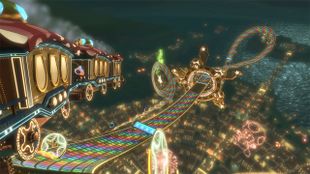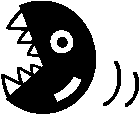N64 Rainbow Road
Template:Articleabout Template:Racecourse
Rainbow Road is the longest race course in Mario Kart 64 at 2,000 meters and requiring around two minutes per lap, making it the longest in the whole series. The track differs from the other Rainbow Roads in that it has rails throughout the track. The track features a transparent multi-colored path and with star-shaped rails running throughout the course. Neon-light pictures of the eight playable characters, plus a portrait of a Boo and a Mushroom in the distance, float in the void. Moreover, a big three-dimensional smiling star lies in a section of the track. Roving Chomps slide through the course in reverse, tossing into the air any driver who touches them. The course returns in Mario Kart 8 as a heavily-revamped retro course, as the last course of the Lightning Cup.
Course layout
The twisting course starts with a huge drop followed by a gentle uphill stretch, passing through a rainbow ring. After the ring, racers behold the flashing neon portraits while run through a pigtail bridge, following then towards another shallower drop. Racers turn around a corkscrew to reach a hairpin bend, and then a twisting stretch to go back to the checked line finally.
Although this track may easily be both the easiest and longest Rainbow Road track due to the railings and length, racers can perform a large shortcut by making a timed hop to the left (or right, during Extra) during the drop at the beginning.
Mario Kart 8
Rainbow Road from Mario Kart 64 returns in Mario Kart 8, appearing as the final course in the Lightning Cup, which is similar to SNES Rainbow Road in Mario Kart 7. It has a large amount of changes to the original.
One of the biggest changes is the setting; just like Rainbow Road in the single-player mode of Mario Kart: Double Dash!!, it now takes place above a brightly lit city near a coast at night instead of a night sky background from the original. The road is now formed by colorful tiles with a bronze-colored frame, as opposed to the slightly transparent stripes from the original version, which is very similar to Rainbow Road from Super Mario Kart, while the starting area has a bronze diamond mosaic pattern.
Another change is the addition of the goal ring at the finish line; once players nearly reach the end, the gear-like goal ring will change its shape by expanding its star-shaped appendages wide and closes in upon itself. Also, there are now some nods to Super Mario Galaxy, such as the stationary star icon that appears in the original being replaced with a giant rotating Grand Star and the star rails are designed after Launch Stars. In addition to the star rails, most of them have been removed, adding that to the challenge. Another visual feature includes a train with Toads (which was absent in the original), who throw coins at certain areas, passing around the course. There are now fireworks around the course, with some that form the six playable characters that have been present since Super Mario Kart (Mario, Princess Peach, Luigi, Yoshi, Toad, and Bowser) that replace the neon-lit signs of the eight playable characters in Mario Kart 64 (the aforementioned six, Wario and Donkey Kong), and portrait of a Boo and a Mushroom from the original. Some of these fireworks take their appearance from stamps in Super Mario 3D World, though Yoshi's firework is based on artwork from Yoshi Topsy-Turvy.
The other big change is that the course has been altered to incorporate the game's hang-glider and anti-gravity mechanics. From a view above the course, the loop, in the middle of which sits the Grand Star, lies on the left side of the circuit instead of on the right side. The dip after the large U-Turn is now a full turn. At the gentle uphill stretch, which succeeds the steep slope, the rainbow ring has been replaced by an anti-gravity panel. Plus, instead of going through the course in a zigzag pattern in the original, the Chomps now bounce up and down, creating a wave on the track that can be used to perform tricks, which is similar, from Mario Kart 7, to how the Thwomps in SNES Rainbow Road create a wave on the track. As the Chomps land, the section they create a wave on will flash. Boost Pads and Launch Stars have been added.
Similar to Rainbow Road from Mario Kart 7, it is split into three sections, instead of three laps, and the final turn has also been shortened, in order to cut down the length of the original, and on the final section, the last part of the music now starts to play, instead of the beginning of the music. It is the first and only retro course to do this.
F-Zero X
F-Zero X has a track that imitates this version of Rainbow Road, having the same map of the track, and following it basically. It is described as a "Psychedelic Experience". Parts, though not all of it, are rainbow-colored. Unlike the original, it has no barriers in certain areas, and the neon Mario series decor is missing - instead, it just has a plain black background with a watery blue bottom to which careless drivers may fall. In addition, when racing the track with the 64DD expansion features, the background song is a rock version of the Rainbow Road song heard in Mario Kart 64. There aren't any Chomps, but there are deadly minefields on certain sections of the track.
Official descriptions
Mario Kart 64 Instruction manual description: This course can be described in a word -- LONG, very long. It is simply the longest of all the courses. As the name indicates, the road is made of rainbow and it has a fantastic view of neon sculptures twinkling in the distance. The final course of the Special Cup, it is definitely worth seeing. It is advisable to slow down to avoid the Chomps that will attack.
Gallery
N64 version
- RainbowRoadMK64.png
The icon from the menu.
Wii U version
- MK8- N64 Rainbow Road.PNG
The track's icon.
- MK8-Course-N64 RainbowRoad-startingline.png
The course, as seen from the starting line.
Approaching the Grand Star in the middle of a loop.
The stamp obtained for beating the staff ghost at this course.
Names in other languages
Trivia
- In Mario Kart 64, the neon lights of Mario, the Mushroom, and Boo are the only ones that are animated.
- Rainbow Road is one of only two non-SNES courses in the series that differ in lap count between its original and remade versions; the other is Baby Park.
- In Mario Kart 8, if the players are very close or in contact to the side of the launch star on the boost pad, the launch star will start spinning, but the players will not get a boost.
- In Mario Kart 8, N64 Rainbow Road, the new Rainbow Road, and the downloadables SNES Rainbow Road and GCN Baby Park, are the only courses in the game to have the map in different colors instead of just blue.
- The map of its reappearance in Mario Kart 8, shown in the Prima guide, has two Boost Pads on the third section placed on the right side. However in the game, they are actually placed on the left side.
- In Mario Kart 8, the placement of the first two boost pads on the steep slope and the first two launch stars varies every time the player enters the race on this course.
- The city below the track resembles Paris, as well as the tower being similar to Eiffel Tower.
- A map of the city, mentioning Toad Harbor, Wii Moo Moo Meadows, and Wii Wario's Gold Mine, can be seen in Super Bell Subway. Thus, N64 Rainbow Road is set above Toad Harbor, Wii Wario's Gold Mine, and Wii Moo Moo Meadows.
- N64 Toad's Turnpike also takes place in the city[1], though it's not listed on the map, implying it is within the bottom half of the city.
References
Template:BoxTop Template:Racecourses










